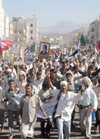Yemen has come under heavy international pressure to end the northern war and focus on fighting al-Qaeda, whose Yemen-based wing claimed responsibility for a failed attack on a U.S.-bound plane in December.

|
|
Supporters of the separatist Southern Movement march in an anti-government protest in the Radfan district in southern Yemen, March 18, 2010. Yemen plans to free Shi’a rebel prisoners within days under a truce to end a long-running war that drew in neighboring oil exporter Saudi Arabia last year, a government official said on Thursday. REUTERS/Stringer |
The move comes after the rebels freed 178 Yemeni soldiers and tribal fighters on Wednesday as both sides move slowly towards implementing conditions of a truce deal to end a war, which has displaced 250,000 people.
“The ministry of interior is reviewing lists of prisoners and they are expected to be released in the coming few days,” a government official told Reuters on Thursday.
The official did not say how many prisoners would be freed, but independent sources said it could be several hundred.
Yemen has come under heavy international pressure to end the northern war and focus on fighting al-Qaeda, whose Yemen-based wing claimed responsibility for a failed attack on a U.S.-bound plane in December.
Yemeni police on Thursday killed a bystander and wounded three others when they opened fire on a separatist rally in the south of the country, activists said.
Several thousand protesters had gathered for a weekly demonstration in support of prisoners, chanting pro-independence slogans such as “Occupation out!” and “Long live free south Yemen.”
Police dispersed them with gunfire and killed a vendor in a marketplace and wounded three passers-by, activists from the Southern Movement said.
On Thursday last week, three activists were killed and five others were wounded in clashes in Daleh and several other southern cities.
Pro-independence demonstrations have increased in the south in recent months amid a worsening economic situation and complaints of discrimination in favor of northerners by the Sanaa government.
South Yemen was independent from 1967 until 1990, when it united with the north.
The south seceded in 1994, sparking a short-lived conflict that ended when the south was overrun by northern troops.
Many in the south — home to Yemen’s oil industry — complain northerners have seized resources and discriminate against them.
Analysts have said the truce agreement between the government and Houthi rebel fighters in the north, who belong to the minority Zaidi sect of Shi’a Islam, was unlikely to last as it does not address the rebels’ complaints of discrimination by the goverment.
Mohammed Abd al-Salam, a spokesman for the Houthi group, said “this issue, once resolved, will serve the cause of peace.”
The Sanaa government on Tuesday said that the Houthis were failing to meet some of the six key points of the ceasefire agreement and accused them of “procrastination.”
Abd al-Salam said the rebels have not been dragging their feet in implementing the terms of the ceasefire.






Leave a Reply